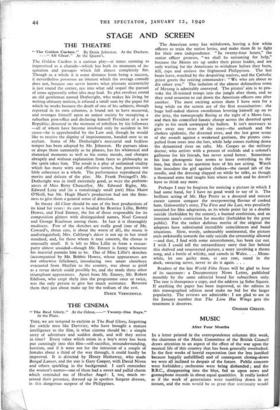STAGE AND SCREEN
THE THEATRE
" The Golden Cuckoo." By Denis Johnston. At the Duchess. --" All Clear." At the Queen's.
The Golden Cuckoo is a curious play—at times seeming as improvised as a charade—which has both its moments of in-
spiration and passages which fall almost completely flat.
Though as a whole it is some distance from being a success, it nevertheless possesses an interest which the average comedy does not, because one never knows what pleasant eccentricity is just round the corner, nor into what odd sequel the pursuit of some apparently sober idea may lead. Its plot revolves round an old gentleman named Dotheright, who makes his living by writing obituary notices, is refused a small sum by the paper for which he works because the death of one of his subjects, though reported in its own columns, is found not to have occurred, and revenges himself upon an unjust society by occupying a suburban post-office and declaring himself President of a new Republic; deserted in the moment of rebellion by his followers —all of whom have become involved only by accident in his cause—he is apprehended by the Law and, though he would like to receive the dignity of imprisonment, handed over to an asylum. Some of Mr. Dotheright's mercurial and feckless temper has been adopted by Mr. Johnston. He pursues ideas or drops them summarily as he pleases, has his whimsical and rhetorical moments as well as his comic moods, and changes, abruptly and without explanation from farce to philosophy as the spirit takes him. The result is a play of unlimited vitality which has many witty and effective scenes, but possesses too little coherence as a whole. The performance reproduced the merits and defects of the play. Mr. Frank Pettingell's Mr. Dotheright was in itself extremely good, as were the perform- ances of Miss Betty Chancellor, Mr. Edward Rigby, Mr. Edward Lexy and (in a tantalisingly small part) Miss Make O'Neill, but Mr. Hugh Hunt's production had not the firm- ness to give them a general sense of direction.
In theory All Clear should be one of the best productions of its kind for years : its cast is headed by Beatrice Lillie, Bobby Howes, and Fred Emney, the list of those responsible for its composition glitters with distinguished names, Noel Coward and George Kaufman among them. In fact it is thoroughly mediocre. Few of the sketches are really good (one of Mr. Coward's, about cats, is about the worst of all), the music is undistinguished, Mrs. Calthrop's decor is not up to her usual standard, and, for those whom it may concern, the chorus is unusually small. It is left to Miss Lillie to form a rescue- party almost unaided—though Mr. Emney is funny whenever his material permits him to be. One of Miss Lillie's sketches (accompanied by Mr. Bobbie Howes, whose appearances are not otherwise felicitous), introducing two smart choirboys evacuated from Mayfair to the country, was about as good as a revue sketch could possibly be, and she made three other triumphant appearances. Apart from Mr. Emney, Mr. Robert Eddison, who crept shyly into the programme once or twice, was the only person to give her much assistance. Between them they just about make up for the tedium of the rest.
DEREK VERSCHOYLE.


































 Previous page
Previous page